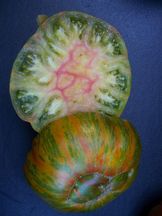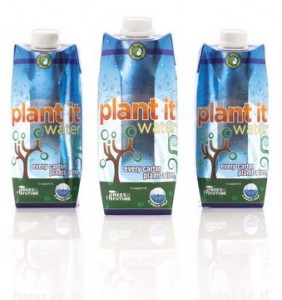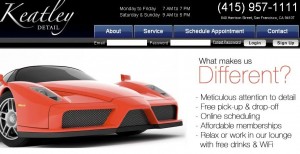"A commodity is some good for which there is demand, but which is supplied without qualitative differentiation across a market." ~Wikipedia "The brain is a commodity used to fertilize ideas." ~Elbert Hubbard  Powerful marketing can come when a business creates alignment of a shared vision between owners, employees and customers . It can also come from product differentiation. I believe that even if you sell a commodity product, there are ideas you can develop to bring differentiation to them. Let's face it. Most small businesses sell me-too products, products that are in essence undifferentiated. But it doesn't have to stay that way. With a lot of thought, maybe even a lot of work, I'm a firm believer that any business can innovate to transform a commodity product or service into a differentiated product. The following businesses are in essence selling commodities. But look at what they've done to create differentiation in their products. Either they are solving a problem that the product itself creates (ex- water bottles are made from petroleum and their disposal adds toxicity to landfills), they've extended the service to provide additional benefits (free pick-up and drop off), or they've wrapped a values based story around the product (100% sustainable urban warehouse farm). BTTR Ventures – This startup in Berkeley California has created a unique, closed loop production model that converts one of the largest waste streams in America – the tons of coffee ground waste generated daily – into a valuable, nutritious product: gourmet, specialty mushrooms that it sells to Whole Foods, at Farmers Markets and online. By creating a 100% sustainable urban warehouse farm, it has a built in values based story that will get noticed. NOTE: BTTR is a finalist for the BBC World Challenge as a small business that has shown enterprise and innovation at a grass roots level. You can vote for them here. Wild Boar Farms – Heirloom tomatoes are already different from the garden-variety tomatoes found at most grocery stores. Yet that's not good enough for Brad Gates at Wild Boar Farms. Brad grows some of the most outrageous tomatoes available on the planet by constantly creating new varieties using heirloom genetics and mutations. He focuses on bi-color and striped varieties with extreme flavor and fascinating looks and gives them Bay-Area centric names such as the Berkeley Tie-Dye, Pink Berkeley Tie-Dye, and the Michael Pollan.
Powerful marketing can come when a business creates alignment of a shared vision between owners, employees and customers . It can also come from product differentiation. I believe that even if you sell a commodity product, there are ideas you can develop to bring differentiation to them. Let's face it. Most small businesses sell me-too products, products that are in essence undifferentiated. But it doesn't have to stay that way. With a lot of thought, maybe even a lot of work, I'm a firm believer that any business can innovate to transform a commodity product or service into a differentiated product. The following businesses are in essence selling commodities. But look at what they've done to create differentiation in their products. Either they are solving a problem that the product itself creates (ex- water bottles are made from petroleum and their disposal adds toxicity to landfills), they've extended the service to provide additional benefits (free pick-up and drop off), or they've wrapped a values based story around the product (100% sustainable urban warehouse farm). BTTR Ventures – This startup in Berkeley California has created a unique, closed loop production model that converts one of the largest waste streams in America – the tons of coffee ground waste generated daily – into a valuable, nutritious product: gourmet, specialty mushrooms that it sells to Whole Foods, at Farmers Markets and online. By creating a 100% sustainable urban warehouse farm, it has a built in values based story that will get noticed. NOTE: BTTR is a finalist for the BBC World Challenge as a small business that has shown enterprise and innovation at a grass roots level. You can vote for them here. Wild Boar Farms – Heirloom tomatoes are already different from the garden-variety tomatoes found at most grocery stores. Yet that's not good enough for Brad Gates at Wild Boar Farms. Brad grows some of the most outrageous tomatoes available on the planet by constantly creating new varieties using heirloom genetics and mutations. He focuses on bi-color and striped varieties with extreme flavor and fascinating looks and gives them Bay-Area centric names such as the Berkeley Tie-Dye, Pink Berkeley Tie-Dye, and the Michael Pollan.  Plant It Water – The first time I ever drank bottled water was on a trip to Indonesia where travelers have health concerns about drinking from the local water supply. Today, portable water is a big convenience to people on the go. As this category has grown, however, so has the landfill waste stream of petroleum based plastic bottles. Plant It addresses the problem by using packaging that is sustainably manufactured, recyclable, and that uses 60% natural resources such as plant fibers. Plant It also supports environmental organizations and is currently planting a tree for every carton sold.
Plant It Water – The first time I ever drank bottled water was on a trip to Indonesia where travelers have health concerns about drinking from the local water supply. Today, portable water is a big convenience to people on the go. As this category has grown, however, so has the landfill waste stream of petroleum based plastic bottles. Plant It addresses the problem by using packaging that is sustainably manufactured, recyclable, and that uses 60% natural resources such as plant fibers. Plant It also supports environmental organizations and is currently planting a tree for every carton sold.  Keatley Detail – Keatley is a business that cleans, polishes and waxes automobiles. Like most service businesses, it's reputation rests on doing a great job and living off word of mouth referrals. But Keatley goes the extra mile by making it easy to do business with them. It offers customers free pick-up and delivery. It allows for online scheduling. It has a business center with wi-fi where customers can work while the car is being cleaned. And it offers free beverages in the business center. In essence, it has taken away any possible reason that an interested prospect might have for not using Keatley. And that's a powerful statement to be able to make.
Keatley Detail – Keatley is a business that cleans, polishes and waxes automobiles. Like most service businesses, it's reputation rests on doing a great job and living off word of mouth referrals. But Keatley goes the extra mile by making it easy to do business with them. It offers customers free pick-up and delivery. It allows for online scheduling. It has a business center with wi-fi where customers can work while the car is being cleaned. And it offers free beverages in the business center. In essence, it has taken away any possible reason that an interested prospect might have for not using Keatley. And that's a powerful statement to be able to make.  Rock & Roll Dentist – I previously wrote about this example of another service business.
Rock & Roll Dentist – I previously wrote about this example of another service business.
If somebody can differentiate a commodity, you can differentiate your products.
Previous post: A simple formula for creating a differentiated marketing position
Next post: 5 Low Cost Consumer Research Ideas